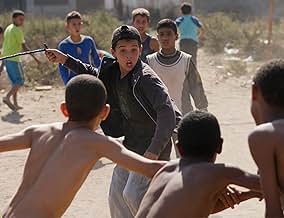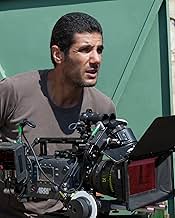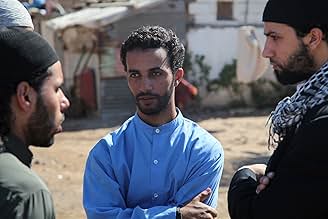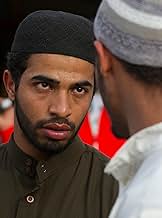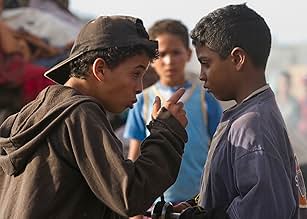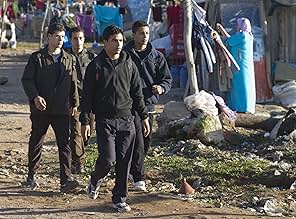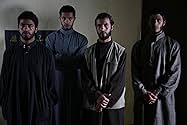CALIFICACIÓN DE IMDb
7.3/10
2.1 k
TU CALIFICACIÓN
Agrega una trama en tu idiomaA fictional account of the lives of the men responsible for the suicide bombings in Casablanca in 2003.A fictional account of the lives of the men responsible for the suicide bombings in Casablanca in 2003.A fictional account of the lives of the men responsible for the suicide bombings in Casablanca in 2003.
- Dirección
- Guionistas
- Elenco
- Premios
- 10 premios ganados y 5 nominaciones en total
Abdelhakim Rachid
- Yachine
- (as Abdelhakim Rachi)
- …
Rabii Benjhail Tadlaoui
- Zaid
- (as Rabii Tadlaoui)
- Dirección
- Guionistas
- Todo el elenco y el equipo
- Producción, taquilla y más en IMDbPro
Opiniones destacadas
On May 16, 2003, Morocco got "its" September 11. How naïve we were to think ourselves as untouchables, if anything the tragedy was a humbling lesson and Morocco's secret services could reinvent their methods in order to nip in the bud terrorist actions. Who needs to be as effective as the Mossad or Scotland Yard when any Moroccan can be a potential informant (an entire cell could be dismantled simply because the building's janitor found suspicious that one man living alone could buy so much bread at once). Anyway, the shock faded with time or switched to other cities such as Madrid in 2004 or London in 2005, what was left from the bombings were anecdotes such as "where were you when it happened?" "I thought it was fireworks".
Still, when I got a job and started enjoying Casablanca's nighttime, I often wondered what if it happened to me... I guess I'm lucky to never have been in the wrong place at the wrong time. But Nabil Ayouch's angle is interesting: adapting Mahi Binebine's "Stars of Sidi Moumen" novel, he exposes terrorists as those born in the wrong place at the wrong time. The place was Sidi Moumen, a Moroccan favela, the wrong time was the aftermath of September 11 that ignited a fire of anger in souls who kept their frustration for too long, and resentment is an excellent combustible.
His movie ends right before the explosion, because whatever happens after was a human tragedy written by statistics, Ayouch is digging deeper, within the psyche of a disillusioned unemployed kid, willing to kill and die. How he doesn't see his victims as innocent is the greatest trick extremism can operate on weak souls, but are their weakness to blame? Ayouch is interested in the human side of outcasts, humanity as vulnerability. In a way, terrorists are the first victims of terrorism. Ayouch doesn't side with them but in "Horses of God" he depicts a sort of life that was so hellish that only the existence of an afterlife for the 'righteous' ones could make it tolerable. People's opium.
The film opens with "City of God" (or Allah) vibes. Boys play football, Tarek aka Yachine is the goalkeeper. They could be my age, I was 12 in 1994. The colors are yellowish and bright, it's childhood, life... but what do they do for a living? Taking stuff from a dump (one of the biggest in the area) and then resell it. When Tarek and Nabil are teased by two kids for their closeness, Tarek's brother Habib come with an improvised chain-like weapon and bomb them with insults that would make an adult weep. Habib is the most resourceful and natural leader, his mother treats him like the man of the house. Indeed with one brother who's stuck to the same corner with an old transistor and a mentally challenged father, we gather that neither Habib or Tarek grew up with models to look up to.
In this time and place, if you didn't become a football player or got yourself on the other side of the Mediterranean sea, your only options were selling fruit or vegetables, being a mechanic or forgetting lost dreams through a certain Moroccan 'plant' to blend with tobacco. Tarek lacked prospects and his brother's magnetism but somehow manages to grow up as a reasonable (albeit irritable) man played by Abdelhakim Rachid, he's Nabil's best friend and is in love with one of the girls from the neighborhood.
Speaking of Nabil (Hamza Souidek), his family background consists of a mother who dances at weddings, which in Moroccan perception equals a prostitute. But never sugarcoating his material, in quite a gut-wrenching scene we see Nabil being abused by Habib... during the childhood part. I was perplex about that scene but I guess Ayouch wanted to show a certain reality about religious people: they have a shady past, some traumas or guilt-inducing factors to make up to. Many praying and dutiful Muslims I knew lead the kind of youths that make mine feel like priesthood.
Ultimately, Habib (Abdelilah Rachid) becomes a delinquent and ends up in jail after a police incident. Both Tarek and Nabil work as mechanic assistants and do quite well. In one of the film's most lighthearted scenes the two drive one of these popular Moroccan motorbikes to get to Rizlene. It's like the two friends riding their white horse in De Sica's "Shoeshine". But Tarek can't talk to her, she's chaperoned by her brother Fouad (Ahmed el-Idrissi Amrani) who'll eventually be part of the terrorist group. Things escalate at Habib's return. He's bearded, talks like a sect guru and the mother is so admirative of him she doesn't even notice the change. Tarek does and doesn't like it. But one incident gives the religious group the opportunity to 'get' them..
From his "Ali Zaoua" to "Much Loved", 'group power' has been a source of inspiration for Ayouch. Maybe that is the real clash of civilization, more than obscurantism vs modernity, it's about the group versus the individual: society encourages us to speak our voices, which Tarek does all along, until he just finds the so awaited inner peace in masculine bonding and collective prayers. But in an ironic twist, as the day of the attack approaches, it's Habib who got cold feet. It was interesting to have that particular insight, we tend to look at these criminals like brainwashed zombies, but how many wanted to leave but couldn't. As for Tarek, even the memory of Rizlene was swept off by the prospects of having plenty of them in the afterlife. Groups again.
"Horses of God" traces the uncompromising road toward that fateful night where kids playing football in Sidi Moumen "saw fireworks" in Casa. At that point, innocent people were dead... as for the terrorists, somehow they were dead already, their fates echoing that line from Alan Parker's "Mississippi Burning" I paraphrased in the title.
On May 16, it was Casablanca burning.
Still, when I got a job and started enjoying Casablanca's nighttime, I often wondered what if it happened to me... I guess I'm lucky to never have been in the wrong place at the wrong time. But Nabil Ayouch's angle is interesting: adapting Mahi Binebine's "Stars of Sidi Moumen" novel, he exposes terrorists as those born in the wrong place at the wrong time. The place was Sidi Moumen, a Moroccan favela, the wrong time was the aftermath of September 11 that ignited a fire of anger in souls who kept their frustration for too long, and resentment is an excellent combustible.
His movie ends right before the explosion, because whatever happens after was a human tragedy written by statistics, Ayouch is digging deeper, within the psyche of a disillusioned unemployed kid, willing to kill and die. How he doesn't see his victims as innocent is the greatest trick extremism can operate on weak souls, but are their weakness to blame? Ayouch is interested in the human side of outcasts, humanity as vulnerability. In a way, terrorists are the first victims of terrorism. Ayouch doesn't side with them but in "Horses of God" he depicts a sort of life that was so hellish that only the existence of an afterlife for the 'righteous' ones could make it tolerable. People's opium.
The film opens with "City of God" (or Allah) vibes. Boys play football, Tarek aka Yachine is the goalkeeper. They could be my age, I was 12 in 1994. The colors are yellowish and bright, it's childhood, life... but what do they do for a living? Taking stuff from a dump (one of the biggest in the area) and then resell it. When Tarek and Nabil are teased by two kids for their closeness, Tarek's brother Habib come with an improvised chain-like weapon and bomb them with insults that would make an adult weep. Habib is the most resourceful and natural leader, his mother treats him like the man of the house. Indeed with one brother who's stuck to the same corner with an old transistor and a mentally challenged father, we gather that neither Habib or Tarek grew up with models to look up to.
In this time and place, if you didn't become a football player or got yourself on the other side of the Mediterranean sea, your only options were selling fruit or vegetables, being a mechanic or forgetting lost dreams through a certain Moroccan 'plant' to blend with tobacco. Tarek lacked prospects and his brother's magnetism but somehow manages to grow up as a reasonable (albeit irritable) man played by Abdelhakim Rachid, he's Nabil's best friend and is in love with one of the girls from the neighborhood.
Speaking of Nabil (Hamza Souidek), his family background consists of a mother who dances at weddings, which in Moroccan perception equals a prostitute. But never sugarcoating his material, in quite a gut-wrenching scene we see Nabil being abused by Habib... during the childhood part. I was perplex about that scene but I guess Ayouch wanted to show a certain reality about religious people: they have a shady past, some traumas or guilt-inducing factors to make up to. Many praying and dutiful Muslims I knew lead the kind of youths that make mine feel like priesthood.
Ultimately, Habib (Abdelilah Rachid) becomes a delinquent and ends up in jail after a police incident. Both Tarek and Nabil work as mechanic assistants and do quite well. In one of the film's most lighthearted scenes the two drive one of these popular Moroccan motorbikes to get to Rizlene. It's like the two friends riding their white horse in De Sica's "Shoeshine". But Tarek can't talk to her, she's chaperoned by her brother Fouad (Ahmed el-Idrissi Amrani) who'll eventually be part of the terrorist group. Things escalate at Habib's return. He's bearded, talks like a sect guru and the mother is so admirative of him she doesn't even notice the change. Tarek does and doesn't like it. But one incident gives the religious group the opportunity to 'get' them..
From his "Ali Zaoua" to "Much Loved", 'group power' has been a source of inspiration for Ayouch. Maybe that is the real clash of civilization, more than obscurantism vs modernity, it's about the group versus the individual: society encourages us to speak our voices, which Tarek does all along, until he just finds the so awaited inner peace in masculine bonding and collective prayers. But in an ironic twist, as the day of the attack approaches, it's Habib who got cold feet. It was interesting to have that particular insight, we tend to look at these criminals like brainwashed zombies, but how many wanted to leave but couldn't. As for Tarek, even the memory of Rizlene was swept off by the prospects of having plenty of them in the afterlife. Groups again.
"Horses of God" traces the uncompromising road toward that fateful night where kids playing football in Sidi Moumen "saw fireworks" in Casa. At that point, innocent people were dead... as for the terrorists, somehow they were dead already, their fates echoing that line from Alan Parker's "Mississippi Burning" I paraphrased in the title.
On May 16, it was Casablanca burning.
A difficult film to review objectively because of the content. It was extremely well done whatever your reaction might be to the story that was told. For those open to the excellent message contained in this film, it would be well worthwhile to watch. To those who see the world solely in black & white, it may, unfortunately, further fuel their prejudices
The story begins with a group of boys born and raised in the squalor of a Moroccan slum. Their lives are shaped by poverty, exploitation within their own community, harassment by the police and indifference to their plight from the government. They develop into young men who have little hope for the future, who use & deal drugs, who get drunk and into fights, who commit crimes & have no hope of meaningful employment, who are harassed & exploited by the police, and who in some cases are put in prison.
At this point in the story some of the young men are rescued ( or further exploited, depending on your point of view) by a group of Muslim men. The young men become part of a community that support & care for one another, pray & receive religious instruction, stop their anti-social behavior, cease committing petty crimes and seem on the road to being model citizens.
But then their education goes beyond the fundamentals of Islam and they learn of the persecution of others of their faith around the world. They are trained in hand to hand combat and indoctrinated with the view that martyrdom for the faith and for the defense of their people is an honorable objective that will ensure their entry into paradise and provide comfort to their families in this life.
To western minds this would appear to be mindless extremism and sacrifice but to be fair virtually every nation and every ideology fights its battles with armies recruited from poor, under-educated young men who have few prospects for the good life experienced by those who want to use them to defend their comfortable status quo or who want them to sacrifice themselves for some cause from which they, the recruiters, would reap the rewards. Whether the exploiters glorify the prospect of an honorable death for king & country, for democracy, for democratic freedom or for religious survival, it amounts to the same thing attracting the disenfranchised through propaganda and short-term rewards to fight and die while those who reap the potential benefits stay out of harm's way.
The message of the film may help some to better understand the circumstances that inspire the recruitment of Islamic fundamentalists who are willing to become martyrs for their faith, but more generally it should open some eyes to the exploitation of marginalized, disaffected people for some "grand cause," whether it is supposedly to preserve a western capitalistic way of life (though certainly not a life enjoyed by most of those recruited) or to restore lost glory (as was twice the case in Germany) or supposedly at the behest of the semi-divine emperor of Japan or to defend the faith as in the crusades or Israeli conflicts and so on throughout history. Glorifying sacrifice from those who have little to lose, by those who have much to gain, is neither unique to Islamic fundamentalists nor to the 21st century. The conditions that produce the ready supply of recruits used to wage wars and terrorism are nothing new either.
Definitely a thought-provoking, well produced film.
The story begins with a group of boys born and raised in the squalor of a Moroccan slum. Their lives are shaped by poverty, exploitation within their own community, harassment by the police and indifference to their plight from the government. They develop into young men who have little hope for the future, who use & deal drugs, who get drunk and into fights, who commit crimes & have no hope of meaningful employment, who are harassed & exploited by the police, and who in some cases are put in prison.
At this point in the story some of the young men are rescued ( or further exploited, depending on your point of view) by a group of Muslim men. The young men become part of a community that support & care for one another, pray & receive religious instruction, stop their anti-social behavior, cease committing petty crimes and seem on the road to being model citizens.
But then their education goes beyond the fundamentals of Islam and they learn of the persecution of others of their faith around the world. They are trained in hand to hand combat and indoctrinated with the view that martyrdom for the faith and for the defense of their people is an honorable objective that will ensure their entry into paradise and provide comfort to their families in this life.
To western minds this would appear to be mindless extremism and sacrifice but to be fair virtually every nation and every ideology fights its battles with armies recruited from poor, under-educated young men who have few prospects for the good life experienced by those who want to use them to defend their comfortable status quo or who want them to sacrifice themselves for some cause from which they, the recruiters, would reap the rewards. Whether the exploiters glorify the prospect of an honorable death for king & country, for democracy, for democratic freedom or for religious survival, it amounts to the same thing attracting the disenfranchised through propaganda and short-term rewards to fight and die while those who reap the potential benefits stay out of harm's way.
The message of the film may help some to better understand the circumstances that inspire the recruitment of Islamic fundamentalists who are willing to become martyrs for their faith, but more generally it should open some eyes to the exploitation of marginalized, disaffected people for some "grand cause," whether it is supposedly to preserve a western capitalistic way of life (though certainly not a life enjoyed by most of those recruited) or to restore lost glory (as was twice the case in Germany) or supposedly at the behest of the semi-divine emperor of Japan or to defend the faith as in the crusades or Israeli conflicts and so on throughout history. Glorifying sacrifice from those who have little to lose, by those who have much to gain, is neither unique to Islamic fundamentalists nor to the 21st century. The conditions that produce the ready supply of recruits used to wage wars and terrorism are nothing new either.
Definitely a thought-provoking, well produced film.
This is an immaculate movie that show many stories in one. Yes it's about how kids became terrorists, but is about much more. About poverty, about the mind's fight for peace in an environment with limited choices and opportunities. Either all out in crime or all out in (the wrong aspects of manipulated) religion or be the chump in the middle being slapped around ..until you are pushed to an extreme side. Where wolves- like in every nation- are ready to recruit these poor, non educated, hopeless young men with a promise of either riches in this world or in the afterworld. When it comes down to it...every army or gang is filled with these kind of men..albeit there can be a big difference of course in how poor or hopeless the young men/women are depending on where they grew up and reside.
The need for a sense of direction and purpose. Love and fear in a dog eat dog world. How to stay clean in so much dirt ?
I love how this film gives a voice to this reality. This is (also) what art is all about..to voice that what needs voicing or to give a voice to those that are screaming but aren't seen nor heard. Expression is what saves one from imploding or exploding ..carrying so much weight.
The director has that privilege of expression, that the people in the movie dont have. But still..it gives a voice..even ifs not directly theirs.
And furthermore to hopefully open the eyes of people that dont know about these lives, and complexity of life in general. To those that are open to it.
Beautifully filmed. A favourite.
It shows how easy it is for anyone to be brainwashed If he lives in certain circumstances. I think almost everyone could fall into the same trap if they were in their place with that difficult life. so who should be blamed? them? Or society? Or religion? All religions are myths and i think religion keeps destroying humanity. this movie is very good
I finally found a version of this film that was not dubbed into French! Over the years I have downloaded, rented and started watching it but gave up as the language was not the original Darija.
I watched the film with a sense of mounting horror and despair. There was not a moment of fat in this feature that told the story of various youths and their families' lives in the sprawling slum of Sidi Moumen. The shantytown had been allowed to exist and enlarge during "Les Années de Plomb" (the years of lead) under the careless watch of King Hassan ll. There is no way out apart from crime, prostitution or marriage to a rich person if one is good looking.
We see the lives of the protagonists from childhood through to the atrocities and how they are twisted and formed by the utter hopelessness of their situation. The local Mafias act on behalf of the cops until the latter decide an arrest is needed, then someone is casually thrown in jail. One of these is Hamid, rough elder brother of Tarek who is ensnared by radical Islam in the klink. Unfolding events trap others too, including Tarek and his friends.
There is a theme throughout the film of hidden homosexuality. Nabil is raped as a preteen and is Tarek's lover later when they are teens despite the latter being in love with Ghislaine, a local beauty. The repair shop's boss tries it on with Nabil too and this is the beginning of the lads' descent into fundamentalism. It's quite subtly done in the film. This is Morocco after all and such things are not spoken about.
The radicalisers are grotesquely true to life in their way of caging and channeling their victims into believing that martyrdom while killing apostates and non-Muslims is acceptable, nay desirable. Of course, they would never go on a mission themselves.
The part that made me weep was when the lads were taken on a solidarity holiday to the mountains just before their mission. These young men were not evil, they were kids who had been deluded and deceived, splashing in mountain streams that they had never had the opportunity to see before and playing football. They had been seduced to terrible effect.
And now I have to declare my interest. I live in Morocco although not in Casablanca. The new tramway extends all the way to Sidi Moumen giving new opportunities to the remaining slums. Morocco has clamped down on jihadists using a network of spies and informers. However, I was by chance in Casablanca the night of the attacks, staying in a hotel 200 yards away from the Safir which was partially blown up. Like an idiot, having heard the explosion from my hotel, I went out to see what had happened. I got about 40 yards down the street before I was lifted off my feet by two burly cops and dragged back to my hotel and slapped hard once they had got me into reception.
I was bewildered ever since and have never truly understood the attraction of being radicalised, either these guys or other terrorists elsewhere. This masterpiece of a film goes a long way to explaining the process to me.
I watched the film with a sense of mounting horror and despair. There was not a moment of fat in this feature that told the story of various youths and their families' lives in the sprawling slum of Sidi Moumen. The shantytown had been allowed to exist and enlarge during "Les Années de Plomb" (the years of lead) under the careless watch of King Hassan ll. There is no way out apart from crime, prostitution or marriage to a rich person if one is good looking.
We see the lives of the protagonists from childhood through to the atrocities and how they are twisted and formed by the utter hopelessness of their situation. The local Mafias act on behalf of the cops until the latter decide an arrest is needed, then someone is casually thrown in jail. One of these is Hamid, rough elder brother of Tarek who is ensnared by radical Islam in the klink. Unfolding events trap others too, including Tarek and his friends.
There is a theme throughout the film of hidden homosexuality. Nabil is raped as a preteen and is Tarek's lover later when they are teens despite the latter being in love with Ghislaine, a local beauty. The repair shop's boss tries it on with Nabil too and this is the beginning of the lads' descent into fundamentalism. It's quite subtly done in the film. This is Morocco after all and such things are not spoken about.
The radicalisers are grotesquely true to life in their way of caging and channeling their victims into believing that martyrdom while killing apostates and non-Muslims is acceptable, nay desirable. Of course, they would never go on a mission themselves.
The part that made me weep was when the lads were taken on a solidarity holiday to the mountains just before their mission. These young men were not evil, they were kids who had been deluded and deceived, splashing in mountain streams that they had never had the opportunity to see before and playing football. They had been seduced to terrible effect.
And now I have to declare my interest. I live in Morocco although not in Casablanca. The new tramway extends all the way to Sidi Moumen giving new opportunities to the remaining slums. Morocco has clamped down on jihadists using a network of spies and informers. However, I was by chance in Casablanca the night of the attacks, staying in a hotel 200 yards away from the Safir which was partially blown up. Like an idiot, having heard the explosion from my hotel, I went out to see what had happened. I got about 40 yards down the street before I was lifted off my feet by two burly cops and dragged back to my hotel and slapped hard once they had got me into reception.
I was bewildered ever since and have never truly understood the attraction of being radicalised, either these guys or other terrorists elsewhere. This masterpiece of a film goes a long way to explaining the process to me.
¿Sabías que…?
- TriviaOfficial submission of Morocco to the Oscars 2014 best foreign language film category.
- Bandas sonorasGouli je t'aime
by Youmni Rabii & City 16
Lyricst & Composer - Youmni Abdellatif
Les chevaux de Dieu (Bande originale du film)
©Les Films du Nouveau Monde, 2013
Selecciones populares
Inicia sesión para calificar y agrega a la lista de videos para obtener recomendaciones personalizadas
- How long is Horses of God?Con tecnología de Alexa
Detalles
- Fecha de lanzamiento
- Países de origen
- Idiomas
- También se conoce como
- Horses of God
- Locaciones de filmación
- Productoras
- Ver más créditos de la compañía en IMDbPro
Taquilla
- Presupuesto
- USD 3,000,000 (estimado)
- Total en EE. UU. y Canadá
- USD 14,817
- Fin de semana de estreno en EE. UU. y Canadá
- USD 2,251
- 18 may 2014
- Total a nivel mundial
- USD 96,277
- Tiempo de ejecución1 hora 55 minutos
- Color
- Mezcla de sonido
- Relación de aspecto
- 1.85 : 1
Contribuir a esta página
Sugiere una edición o agrega el contenido que falta


